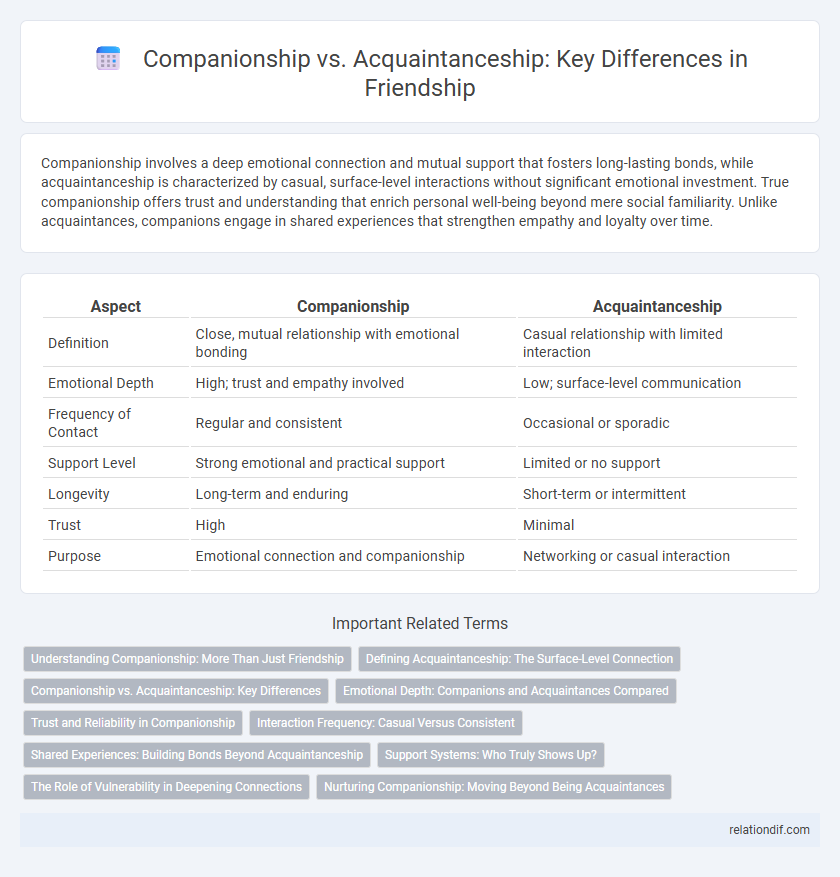Companionship involves a deep emotional connection and mutual support that fosters long-lasting bonds, while acquaintanceship is characterized by casual, surface-level interactions without significant emotional investment. True companionship offers trust and understanding that enrich personal well-being beyond mere social familiarity. Unlike acquaintances, companions engage in shared experiences that strengthen empathy and loyalty over time.
Table of Comparison
| Aspect | Companionship | Acquaintanceship |
|---|---|---|
| Definition | Close, mutual relationship with emotional bonding | Casual relationship with limited interaction |
| Emotional Depth | High; trust and empathy involved | Low; surface-level communication |
| Frequency of Contact | Regular and consistent | Occasional or sporadic |
| Support Level | Strong emotional and practical support | Limited or no support |
| Longevity | Long-term and enduring | Short-term or intermittent |
| Trust | High | Minimal |
| Purpose | Emotional connection and companionship | Networking or casual interaction |
Understanding Companionship: More Than Just Friendship
Companionship transcends mere acquaintanceship by fostering deep emotional bonds and mutual support, distinguishing itself from casual relationships that lack significant personal investment. It involves active listening, empathy, and consistent presence, creating a foundation of trust and shared experiences that enrich well-being. Unlike superficial connections, companionship nurtures resilience and a profound sense of belonging through meaningful interactions and genuine understanding.
Defining Acquaintanceship: The Surface-Level Connection
Acquaintanceship refers to a surface-level connection characterized by casual interactions and limited emotional depth, often based on situational or social convenience. Unlike companionship, which involves trust, shared experiences, and emotional support, acquaintanceship maintains a boundary of familiarity without deeper personal engagement. This form of relationship typically lacks the intimacy and commitment found in true friendships.
Companionship vs. Acquaintanceship: Key Differences
Companionship involves deep emotional bonds characterized by trust, mutual support, and shared experiences, whereas acquaintanceship is defined by superficial interactions and limited personal connection. Emotional intimacy and consistent presence during significant life events distinguish companionship from casual acquaintanceship. The quality of communication and reciprocal care are essential markers that separate true companionship from mere acquaintanceship.
Emotional Depth: Companions and Acquaintances Compared
Companionship involves a deep emotional connection characterized by trust, empathy, and shared experiences that foster vulnerability and support. Acquaintanceship typically lacks this level of emotional depth, often limited to surface-level interactions and social pleasantries. The emotional bond in companionship enhances psychological well-being and provides a sense of belonging absent in casual acquaintances.
Trust and Reliability in Companionship
Companionship is distinguished by deep trust and consistent reliability, forming a foundation that acquaintanceship often lacks. Trusted companions provide unwavering support during challenges, fostering emotional security and mutual dependability. This reliability in companionship strengthens bonds beyond surface-level interactions, creating meaningful, lasting relationships.
Interaction Frequency: Casual Versus Consistent
Friendship thrives on consistent interaction, fostering deeper emotional bonds through regular communication and shared experiences. Acquaintanceship, characterized by casual, infrequent encounters, lacks the sustained engagement necessary for meaningful connection. Frequent interactions solidify trust and understanding, distinguishing true companionship from mere familiarity.
Shared Experiences: Building Bonds Beyond Acquaintanceship
Shared experiences create emotional depth and trust that distinguish companionship from mere acquaintanceship, fostering a stronger, more meaningful bond. Engaging in activities together, whether joyful or challenging, builds a foundation of mutual understanding and empathy. These moments transform casual interactions into lasting connections that define true friendship.
Support Systems: Who Truly Shows Up?
True companionship is characterized by consistent emotional support and genuine presence during life's challenges, surpassing the superficial interactions found in acquaintanceship. Companions actively listen, provide comfort, and offer practical help, forming a reliable support system that nurtures mental well-being. Acquaintances, while pleasant, often lack the depth and commitment required to truly show up when it matters most.
The Role of Vulnerability in Deepening Connections
Vulnerability acts as a crucial catalyst in transforming mere acquaintanceship into meaningful companionship by fostering trust and emotional intimacy. Sharing personal fears and aspirations encourages mutual understanding, allowing relationships to deepen beyond superficial interactions. This willingness to be open creates a foundation where genuine support and lasting bonds can flourish.
Nurturing Companionship: Moving Beyond Being Acquaintances
Nurturing companionship requires deep emotional investment, trust-building, and shared experiences that transcend the superficial interactions typical of acquaintanceship. True companionship fosters mutual support, vulnerability, and consistent communication, creating a strong bond essential for long-lasting relationships. Moving beyond mere acquaintanceship involves prioritizing quality time and empathy, transforming casual connections into meaningful, enduring friendships.
companionship vs acquaintanceship Infographic

 relationdif.com
relationdif.com